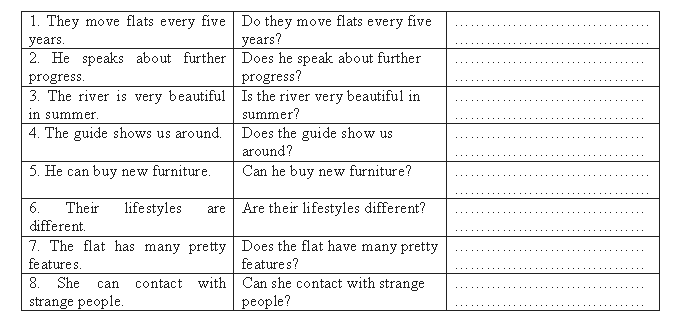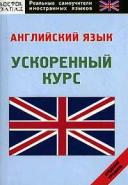Книга: Английский язык: самоучитель
FOCUS ON GRAMMAR Активная грамматика
FOCUS ON GRAMMAR
Активная грамматика
The Present Simple (Indefinite) Tense (more practice)
Настоящее простое (неопределенное) время (дополнительная практика)
1. Complete the sentences with the Adverbs of Time (often, always, never, usually, seldom, sometimes, every day / year / month / week).
Дополните предложения наречиями-определителями (часто, всегда, никогда, обычно, редко, иногда, каждый день / год / месяц / неделю).
1. He contacts with pleasant people.
2. We live in the natural environment.
3. She rents a furnished flat.
4. They locate the electrical power station there.
5. They move flats.
6. They buy available furniture.
7. You see ducks in the downtown.
8. He changes his lifestyle.
9. The children relax in the playroom.
2. Write in the verbs in the correct form.
Напишите глаголы в правильной форме.
I (not to contact)……………………………….
The flat (to have)………………………………
She (to enjoy)…………………………………..
David (not to rent)……………………………..
The room (not to have).……………………….
Sandra (not to move)………………………….
You (to show)………………………………….
He (not to relax)………………………………
People (not to prefer)…………………………
They (to enjoy)………………………………..
We (not to live)….……………………………
Nat (to do)……………………………………..
They (to stay)…..……………………………..
She (not to think)………………………………
3. Translate the sentences into English.
Переведите предложения на английский язык.
1. Она предпочитает расслабляющую музыку. ………………………………………………..
2. Мы не часто катаемся на лыжах. ………………………………………………..
3. Эта фирма не покупает меблированные квартиры. ………………………………………………..
4. Он не остается в деловой части города после работы. ………………………………………………..
5. Эта квартира не имеет балкона. ………………………………………………..
6. Они снимают квартиру с камином. ………………………………………………..
7. Мы не размещаем дома в доках. ………………………………………………..
8. Он редко передвигает мебель в своей новой квартире. ………………………………………………..
4. Complete the questions.
Закончите вопросительные предложения.
1. Does the flat….………………………………………………………………………………..?
2. Does your friend……………………………………………………………………………….?
3. Do they…………………………………………………………………………………………?
4. Do you………………………………………………………………………………………….?
5. Do your guests………………………………………………………………………………….?
6. Does the artist…………………………………………………………………………………..?
7. Does your husband……………………………………………………………………………..?
8. Do your children……………………………………………………………………………….?
5. Ask one Special question and answer it.
Задайте один специальный вопрос и дайте на него ответ.
Example: The house has a balcony.
How many balconies does the house have?
The house has one balcony.
1. She rents a big furnished flat.
2. She relaxes in the bathroom.
3. They contact with their French guests.
4. We locate the gas line further from the house.
5. They enjoy skiing in winter.
6. I show her the pretty features of my flat.
7. He goes fishing to his preferred lake.
Language focus 2
Types of Questions
Типы вопросов
В английском языке существует 5 основных типов вопросов:
– общие;
– специальные;
– вопросы к подлежащему;
– альтернативные;
– расчлененные.
Общие вопросы начинаются со вспомогательного глагола: do, does, am, are,is, can и т. д. Произносятся они, в основном, с восходящим тоном. На них можно ответить кратко «да» или «нет». Они задаются ко всему предложению целиком.
Например: Do they go swimming every day?
Does she live in a flat?
Can they stay here?
Специальные вопросы начинаются с вопросительных слов и задаются к отдельному члену предложения. Они произносятся, в основном, с нисходящим тоном. Их формула: вопросительное слово+общий вопрос.
Например: Why do they go swimming every day?
Where does she live?
When can they stay here?
Вопросы к подлежащему начинаются с вопросительных слов who – кто и what – что. В них не используется вспомогательный глагол (за исключением случаев, когда вспомогательный глагол является основным глаголом предложения, как is, are, am, can). Глагол в таких вопросах ставится в форме единственного числа.
Например: Who goes swimming every day? (Сравните с русским: Кто ходит плавать, а не: Кто ходят плавать.)
Who lives in a flat?
Who can stay here?
Альтернативные вопросы – такие, где спрашивается о выборе с использованием or – или. Они строятся по формуле общего вопроса.
Например: Do they go swimming or fishing every day?
Does she live in a house or in a flat?
Can they or we stay here?
Расчлененные вопросы состоят из двух частей: самого предложения и краткого общего вопроса к нему, которое переводится: «не так ли?»
Если предложение утвердительное, то в кратком общем вопросе к нему (в хвостике) вспомогательный глагол используется в отрицательной форме. Если предложение отрицательное, то в кратком общем вопросе к нему (в хвостике) вспомогательный глагол используется в утвердительной форме.
Например: They go fishing every day, don’t they? – Они ходят на рыбалку каждый день, не так ли?
They don’t go fishing every day, do they?
She lives in London, doesn’t she?
She doesn’t live in London, does she?
We can stay here, can’t we?
We can’t stay here, can we?
6. Ask General Questions. Give negative answers.
Задайте общие вопросы. Дайте отрицательные ответы.
Example: He lives in a furnished flat. Does he live in a furnished flat? He doesn’t live in a furnished flat.
1. They seldom stay in London. ………………………………
2. He can enjoy natural environment. ………………………………
3. Alice prefers relaxing lifestyle. ………………………………
4. This double bed is available. ………………………………
5. These fireplaces are modern. ………………………………
6. Electrical power is very expensive there. ………………………………
7. My guests prefer freedom. ………………………………
8. She rents a house with a gas line. ………………………………
7. Read the sentences and General Questions to them. Then write a Special Question to each.
Прочитайте предложения и заданные к ним общие вопросы. Составьте по одному специальному вопросу.

8. Make up the Who-questions.
Составьте вопросы к подлежащему.
1. Who / contact / different people? ………………………………………………………
2. Who / like / listen / rock music? ………………………………………………………
3. Who / get up / six o’clock? ………………………………………………………
4. Who / can / rent / modern / cottage? ………………………………………………………
5. Who / is / balcony? ………………………………………………………
6. Who / prefer / furnished flats? ………………………………………………………
9. Complete the Alternative Questions.
Задайте альтернативные вопросы.
1. Does she live……………………………………………………………….?
2. Do they contact…………………………………………………………….?
3. Can you…………………………………………………………………….?
4. Is the flat……………………………………………………………………?
5. Are the bridges……………………………………………………………..?
6. Am I………………………………………………………………………..?
7. Would you like to………………………………………………………….?
10. Match the halves of the Tag-questions.
Составьте разделительные вопросы.

11. Read the questions and translate them. Underline the auxiliary verb.
Прочитайте вопросительные предложения и переведите их. Подчеркните вспомогательный глагол.
1. Where do you want to rent a flat?…………………………………………………………..….
2. Is their lifestyle different?………………………………………………………………….….
3. Who contacts those managers? …………………………………………………………….….
4. Would you like to buy or to rent a house?…………………………………………………….
5. Do they go skiing every weekend?..……………………………………………………….….
6. The meeting is pleasant, isn’t it? ……………………………………………………………..
7. Does he move to Japan or to India?…………………………………………………….….….
8. Who often stays in the hotel?……………………………………………….…………………
9. How much furniture do you buy?……………………………………………………………..
10. They don’t locate the kitchen here, do they?………………………………………………..
12. Make up 5 questions to each of the sentences (one question of each type).
Составьте по пять вопросов к каждому предложению (по одному вопросу каждого типа).
1. Sam has a big garage.
2. The downtown is lovely.
3. They can change their lifestyle.




